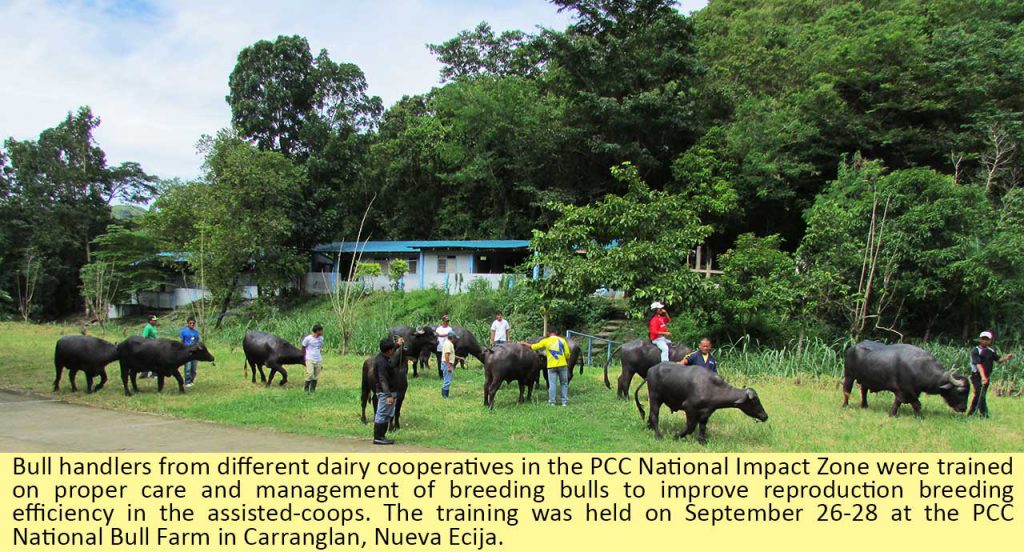Farmer-trustees in the National Impact Zone (NIZ) of the Philippine Carabao Center (PCC) underwent a three-day bull management training on September 26-28 at the PCC National Bull Farm in Barangay Joson, Carranglan, Nueva Ecija.
The training was organized under PCC’s Dairy Herd Improvement and Enterprise Development Program (DHI-EDP) and conducted by technical staff of PCC at Central Luzon State University (PCC-CLSU).
The participants are dairy farmer-members of Guiset Organic Farmers Credit Cooperative, Bagong Pag-asa ng Magsasaka Multi-Purpose Coop, Simula ng Panibagong Bukas Producers Coop, Brotherskeeper MPC, Sunbeam MPC, Ayos Lomboy Dairy Coop, Pulong Buli Primary MPC, San Rafael Dairy Producers Coop, Catalanacan Primary MPC, Agpapa Irrigators Association, Samahan Sta. Monica para sa Likas Kayang Pag-unlad, San Manuel Dairy Association, and Bibiclat Dairy Producers Coop.
The training was conducted based on the results obtained from the assessment and planning conducted by the DHIP team. Among others, it was found out that some NIZ cooperative- members who were beneficiaries of the bull deployment program were urgently in need of upgraded skills in reproductive management of the animal entrusted to them in order to attain the goal of healthy calves’ production.
Thus, the training sought to instill heightened awareness about good bull management among the participants to help address concerns in the reproductive aspect of the animals in consonance with the genetic improvement program of PCC.
“This training was actually a preparation so that when they received their loaned bulls, they already know the proper handling and management for their bulls to be more productive,” Reyner Tomas, PCC science research assistant and NIZ bull loan coordinator, said.
He added that the participants who requested for the bulls are those in areas not reached by AI services.
The PCC-CLSU experts who served as resource persons during the training included Dr. Edwin Atabay, center director of PCC-CLSU; Dr. Fe Venturina, artificial insemination (AI) and bull loan coordinator; Hernando Venturina, national bull farm head; Nomer Garcia, forage and pasture production and management unit head; Perla Florendo, animal nutrition head; Ruby Gabriel, assistant bull loan coordinator; and Christine Adriano, assistant training coordinator.
Discussions and orientation on group activities as well as evaluation and registration were facilitated by Jessie Elmar Malamug, training coordinator, and Phoebe Burnot, training quarter in-charge.
In his lecture, Atabay emphasized the importance of and the impact of the carabao development program (CDP) on the lives of farmers by upgrading native carabaos to the status of high milk producers.
“The CDP is a social program for the welfare of the rural farmers. It involves the utilization of AI and bull loan. In social transformation, we need farmers like you to implement the CDP through bull loan program,” he said.
Atabay added that the training envisioned to help the farmer-participants to know the basic practices on carabao production and be aware on the various signs that carabao exhibit during its estrus cycle. He also stressed that when a female buffalo fails to get pregnant after its three consecutive cycles through AI, it should only then that the bull be used for natural mating.
“We have to consider behavioral signs of estrus such as swelling of the vulva and reddening of the vaginal epithelium, mucous discharges of varying viscosity, restlessness and lack of appetite, frequent urination, bellowing, mounting other animals in the herd, and standing still when mounted by a bull or other female buffalo,” the PCC at CLSU head said in his presentation.
Dr. Fe Venturina, on the other hand, provided tips on how to properly check the female carabao when it is in heat. She said that of all the signs of carabaos in heat, the most important is that they “stand still when mounted”.
She also said that in the bull loan program, bull handlers can ask for a fee from the farmers who own the carabaos serviced by the bull. The bull handlers likewise get an incentive for every calf drop from the bull-mated buffaloes if they are qualified under the applicable PCC requirements.
Aside from lecture-discussions, experiential learning was also utilized wherein the participants underwent hands-on sessions on bull-taming, handling and management of bulls during semen collection, hay and silage making, and care and management of bull breeding.
“Malaking tulong sa’kin itong training kasi ngayon may siyam akong kalabaw, malayo ang AI technicians sa’min kaya lumilipas ‘yong paglalandi na hindi agad naee-AI. Nag-bull loan ako para kung sakaling makitaan ko ng senyales ‘yong apat kong inahin ay may nakatugon na agad akong bulugan (The training helped me a lot as I currently have nine buffaloes and our area is far from the AI technicians, thus the estrus passes without being inseminated. I loaned a bull so that when I see signs of estrus on my four breeders I have a bull on hand for mating),” Glenn Bert Alonzo, one of the participants from Brotherskeeper MPC, said.

